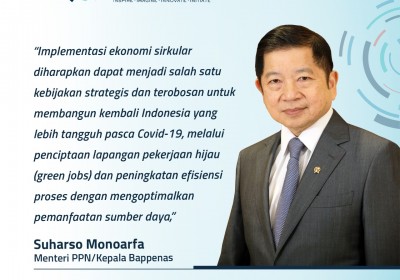Bappenas Assists Coordination Efforts Between Central and Regional Projects
March 12, 2021
JAKARTA – To accelerate national development efforts, the Ministry of National Planning/Bappenas plan to introduce several coordination strategies that would help synergize national projects and regional projects, during the government’s 2021 Developmental Planning Technical Coordination Meeting (Rakortekrenbang).
National Planning Minister/Bappenas head Suharso Monoarfa said that the 2021 Rakortekrenbang, a conference which aims to coordinate all active and planned national and regional projects in Indonesia, is key in formulating a mutual understanding between parties involved in regional development projects and activities.
“The Rakortekrenbang is crucial in helping develop the potential of certain regions and aiding them to meet their national development targets for the sake of the people and also the country,” Minister Suharso said in a written statement on Thursday (25/2).
Several strategic development projects that will be prioritized in 2022 include: the construction of industrial zones and 31 smelters, increasing the role of UMKMs in the economy, renewable energy, establishing food estates, rejuvenating 10 crucial tourism hotspots, reforming the social security system and the healthcare system, implementing skill-based education reforms, developing an efficient port network, fostering digital transformation, as well as major infrastructure projects such as development efforts in Papua and the new capital city project in Kalimantan.
Discussions on these projects will lead to the formation of the government’s 2022 working plan (RKP), the 2022 Ministries and Government Institutions Working Plan (Renja), and the 2022 Regional Government Working Plan.
Minister Suharso emphasizes a need to focus on programs that are in line with the 2022 RKP’s theme of “Economic Recovery and Structural Reformation” such as social and economic transformation schemes, business competitiveness optimization and equal distribution of economic development.
Economic activity in Java still contributes a lions share to Indonesia’s gross domestic product (GDP) with 60.1%. In comparison, Sumatra, the second-highest contributor, only contributes 21.2%, with the remaining regions contributing far less.
Regional areas are expected to develop their economy to help mitigate the economic effects of the COVID-19 pandemic. The distribution and effective implementation of vaccines in regional areas, according to Minister Suharso, is crucial in achieving this recovery. Bappenas projects that by September 2021, the number of COVID-19 cases in the country would begin to decrease and herd immunity could be reached by March 2022. If nationwide vaccination efforts were accelerated further, Indonesia might see a decrease in cases by July 2021.
“And when that happens, industries can optimally resume operations, the economy can begin to stabilize, public mobility will resume, consumption rates return to normal levels and therefore household spending will increase. Higher consumption rates can stimulate our GDP again, especially considering household spending and consumption dominates the makeup of our GDP,” Minister Suharso said.
The government must also take the valuable lessons they learned during COVID-19 to further prevent the spread of other major diseases such as tuberculosis, malaria and leprosy, as well as improve the service quality of hospitals and medical centers (puskesmas). Bappenas data shows that only 18% to 30% of all puskesmas in the country meet national standards. By 2022, the government aims to increase that number to 71%.
Considering the pandemic and the spotlight on health issues, the challenge of increasing the country’s basic immunization rate is also a priority issue in the 2022 RKP.
“We have only achieved a 57% basic immunization rate whereas our neighboring countries have succeeded above 90%, or even reaching 100%. We want to boost our number to 100% by 2024. Immunizations should be one of the regional governments’ top priorities ahead,” Minister Suharso said.
Indonesia’s Research Institutions Supporting the Development of the Electric Vehicle Industry
Indonesian Muslim Fashion and Cosmetics IKMs Shine at Dubai World Expo 2020
Govt Steps Up UMKM Transformation Efforts in the Midst of Pandemic Slowdown
Govt Encourages Promotion of IKM Products in Digital Era
Government Begins Developing Maritime Training Center in Makassar
Tweets by IDDevForum
